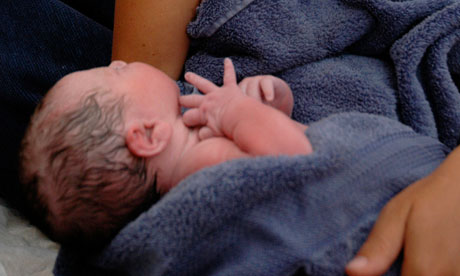
It may come as a surprise to hear that a doula like me has sympathy with those reacting in fear and anger to Thursday's Royal College of Obstetrician and Gynaecologist's report. As a woman who chose homebirth, I wholeheartedly agree with its statements that "too many babies are born in the traditional 'hospital' setting" and that "women deserve a medical service which focuses around their needs, is safe and effective … and one in which the woman's informed choice is respected".
However, in my doula work – which involves providing non-medical support to women and families during labour, childbirth and the postpartum period – it isn't my place to comment on what type of care is best for a woman; only she can decide that. Reassuringly, science demonstrates the positives of midwife-led care for low-risk pregnancies. A recent Cochrane review concluded that "midwife-led care confers benefits for pregnant women and their babies and is recommended" while finding numerous benefits and no adverse effects.
In stark contrast to the above the words that crop up most frequently in the comments sections of major paper's websites today are "risk", "danger" and "pain". When there is a perception that childbirth is inherently dangerous and agonisingly painful, it is logical that this proposal is being seen by many as a terrifying way of saving money at women's expense.
According to RCOG, under 10% of births happen outside hospital. For the other 90% to be confident that the offer of non hospital-based care is a positive step forwards, perhaps we need to look more closely at this concept of "informed choice".
The kind of work we doulas do antenatally means that women and their partners are signposted to resources about the benefits and risks of their choices. They know how women's bodies and hormones actually work and understand why feeling safe, relaxed and continuously supported (something often easier to achieve in a home or birth centre environment) is hugely important to the process at work during birth. They have developed trust in the woman's body and worked through their fears. They feel supported in whatever choice they make.
That many of these women confidently opt for home birth (often because they believe it is the safest option for them) is unsurprising. Just as unsurprising is that the vast majority of women who haven't had this support and information feel the same course of action would be putting themselves at risk.
As Bridget Baker of Doula UK states: "The care that doulas give to women should be available across the board and any 'radical rethink' should include better education for young people about birth."
For the RCOG plan to work surely a real cultural shift is needed. Without more information and support we simply can't expect people who have so recently and vigorously been persuaded out of the home and in to hospital to give birth to forget the often-erroneous arguments of safety, cleanliness and pain relief that were used in the last century to make that shift possible.
How can women who have had no education in the physiological process of birth at school be expected to know that simply with the right setting and support team they have statistically less chance of needing pain relief, a caesarean or an instrumental delivery and are more likely to feel happy with their experience? Until they know this it will be hard for them to accept the standardisation of maternity care away from hospital.
That 2011 sees UK obstetricians speaking about the importance of women's experiences and advocating a holistic approach to care is a positive thing. However, much work is needed before the RCOG maternity recommendations will be seen as broadening choice and improving safety and comfort, rather than forcing women into cheaper but less experienced and equipped care.
Perhaps the next step is to look at how we can nurture our anxious society so that it has the information at hand, the education as standard and the support as needed to make positive decisions based on knowledge rather than fear.

